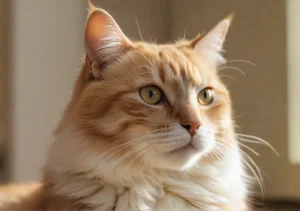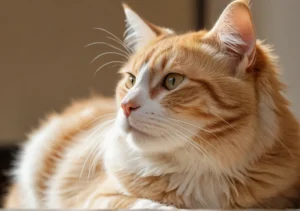Cats with heart disease often experience weight loss as a symptom of their condition. This can be concerning for pet owners, but understanding why this happens can help provide better care for their feline companions.
Heart disease in cats can lead to a variety of symptoms, one of which is weight loss. This can be due to factors such as decreased appetite, increased energy expenditure, or the body’s increased need for nutrients to support the heart.
How does heart disease impact a cat’s appetite?
When a cat is dealing with heart disease, it can have a significant impact on their appetite. Heart disease can cause a cat to feel lethargic and less interested in eating. This is often due to the fact that the heart is not functioning properly, leading to decreased blood flow to the digestive system. As a result, the cat may experience nausea or discomfort when trying to eat, leading to a reduced appetite.
Additionally, fluid buildup in the lungs or abdomen, a common symptom of heart disease, can also contribute to a cat’s decreased appetite. This fluid buildup puts pressure on the stomach, making it uncomfortable for the cat to eat. As a result, they may eat less or even refuse food altogether.
It’s essential to monitor your cat’s appetite closely if you suspect they may have heart disease. A sudden change in eating habits could be a sign that something is wrong, and prompt veterinary intervention is crucial to ensure your cat gets the care they need to manage their heart disease effectively.
What role does increased energy expenditure play in weight loss for cats with heart disease?
In cats with heart disease, increased energy expenditure can play a significant role in weight loss. When the heart is not functioning properly, it has to work harder to pump blood throughout the body. This increased workload can lead to a higher metabolic rate, causing the cat to burn more calories even at rest.
As a result, cats with heart disease may lose weight despite maintaining their regular eating habits. The body’s increased energy demands can lead to muscle wasting and fat loss, contributing to overall weight loss in the cat.
In addition to increased energy expenditure, cats with heart disease may also experience exercise intolerance. This means that they may be less active than usual, further contributing to weight loss as they burn fewer calories through physical activity.
To help manage weight loss in cats with heart disease, it’s essential to work closely with your veterinarian to develop a comprehensive treatment plan. This may include medications to support heart function, as well as dietary modifications to ensure your cat is getting the nutrients they need to maintain a healthy weight. Regular monitoring and adjustments to the treatment plan may be necessary to help your cat maintain a healthy weight despite their heart disease.
And remember, always consult with your veterinarian for the best advice tailored to your cat’s specific needs.
Why do cats with heart disease lose weight?
Cats with heart disease often lose weight due to the increased energy demands placed on their bodies as their hearts work harder to pump blood efficiently. The heart’s inability to function properly can lead to a decreased appetite and reduced ability to absorb nutrients from food, resulting in weight loss. Additionally, fluid buildup in the lungs and abdomen can contribute to weight loss as well. If you notice your cat losing weight unexpectedly, it’s crucial to consult your veterinarian for a proper diagnosis and treatment plan.
Are there specific nutrients that can help support a cat with heart disease and prevent weight loss?
- Omega-3 fatty acids: These can help support heart health and reduce inflammation.
- Taurine: Essential for heart function and overall well-being.
- Protein: High-quality protein sources can help maintain muscle mass.
- Low sodium: To prevent fluid retention and support heart function.
Ensuring your cat’s diet is rich in these nutrients can help support heart health and prevent weight loss. Always consult with your veterinarian before making any significant dietary changes for a cat with heart disease.
How can pet owners monitor their cat’s weight and appetite to ensure they are healthy?
Keeping track of your cat’s weight and appetite is essential to ensure they are healthy. Weigh your cat regularly using a pet scale and keep a log of their weight over time. Monitor their food intake and look out for any changes in appetite or eating habits. If you notice significant weight loss or a decrease in appetite, consult your veterinarian immediately. Additionally, consider incorporating interactive feeding toys or puzzles to encourage your cat to eat and stay active. Regular vet check-ups can also help catch any potential issues early on. Remember, a proactive approach to monitoring your cat’s weight and appetite can help maintain their overall health and well-being.
Why do cats with heart disease lose weight?
Cats with heart disease often lose weight due to a variety of factors. Heart disease can lead to a decreased appetite in cats, causing them to eat less and subsequently lose weight. Additionally, the energy expenditure of the heart working harder can contribute to weight loss as well. The inflammation and fluid buildup associated with heart disease can further impact a cat’s weight by affecting their ability to metabolize nutrients effectively. It’s important to monitor your cat’s weight closely if they have heart disease and consult with your veterinarian for proper nutritional management.
What are the treatment options for cats with heart disease and weight loss?
When it comes to treating cats with heart disease and weight loss, your veterinarian may recommend a combination of medication to manage the heart condition and dietary adjustments to support weight gain. Providing high-quality, easily digestible food can help ensure your cat is receiving the necessary nutrients despite a decreased appetite. Supplements such as omega-3 fatty acids may also be beneficial in supporting heart health and weight management in cats with heart disease. Regular check-ups and monitoring of your cat’s condition are crucial in adjusting treatment as needed.
Treatment options for cats with heart disease and weight loss:
- Prescription medications to manage heart condition
- Specialized diet tailored for weight gain and heart health
- Supplements like omega-3 fatty acids to support heart function
- Regular check-ups to monitor progress
Can weight loss in cats with heart disease be reversed or managed effectively?
While weight loss in cats with heart disease can be challenging to reverse completely, it can be managed effectively with the right approach. By working closely with your veterinarian to develop a comprehensive treatment plan that includes medication, dietary changes, and regular monitoring, you can help support your cat’s overall health and well-being. Consistent monitoring of your cat’s weight, appetite, and energy levels is key to making adjustments as needed to promote weight gain and maintain a healthy body condition. By taking a proactive approach to managing weight loss in cats with heart disease, you can help improve their quality of life and overall prognosis.
Remember, early intervention and regular veterinary care are crucial in managing weight loss in cats with heart disease effectively.
Why do cats with heart disease lose weight?
Cats with heart disease may lose weight due to a condition called cardiac cachexia, a metabolic disorder where the body is unable to utilize nutrients effectively. This inefficiency can lead to weight loss, as the body struggles to maintain muscle mass and overall health. Additionally, heart disease can cause a decrease in appetite, leading to reduced food intake and subsequent weight loss. If you notice your cat losing weight unexpectedly, it’s crucial to consult with your veterinarian to determine the underlying cause and appropriate treatment plan.
Are there any lifestyle changes that can help support a cat with heart disease and weight loss?
Balanced Diet: Feed your cat a high-quality, balanced diet tailored to their specific needs, especially if they have heart disease. Your veterinarian may recommend a diet low in sodium and rich in essential nutrients to support heart health and optimal weight.
Regular Exercise: Encourage gentle exercise to help your cat maintain muscle mass and overall wellbeing. Consult with your veterinarian to determine safe exercise routines suitable for your feline friend’s condition.
Stress Management: Reduce stress in your cat’s environment, as stress can exacerbate heart disease symptoms and impact weight loss. Provide a calm and comfortable space for your cat to relax and unwind.
Medication Compliance: Ensure your cat receives prescribed medications regularly and as directed by your veterinarian. Proper medication management is crucial in managing heart disease and supporting weight loss.
Regular Veterinary Check-ups: Schedule routine check-ups with your veterinarian to monitor your cat’s heart health and weight. Regular assessments can help track progress, adjust treatment plans as needed, and address any concerns promptly.
Fun Facts About Cats and Heart Health
- Did you know that cats have a higher heart rate than humans, typically ranging from 140 to 220 beats per minute?
- Cats are masters at hiding signs of illness, including heart disease. Regular veterinary check-ups are essential to detect any underlying health issues early.
- Just like humans, cats can benefit from a heart-healthy diet and lifestyle to support overall heart health and wellbeing.
Alex, a passionate animal lover, has experience in training and understanding animal behavior. As a proud pet parent to two dogs and three cats, he founded AnimalReport.net to share insights from animal experts and expand his knowledge of the animal kingdom.




